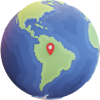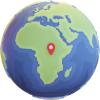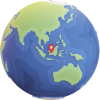Case studies are organised by region, with each region featuring links to the countries where the case studies are located.
Cameroon

A report by Afrik 21 has found that the export of Cameroonian timber to Vietnam involves significant environmental and fiscal abuses, including illegal logging and false invoicing. To safeguard its forest biodiversity, which covers 48% of the country, Cameroon enacted a law in 1999 that strictly bans the export of certain wood species in log form, including doussie, mukulungu, sapelli, padouk, and movingui. However, after a three-year investigation into the timber trade route between Cameroon and Vietnam, the Environmental Investigation Agency (EIA) and the Centre for Environment and Development (CED) have uncovered the extent of illegal activities in the sector, characterised by corruption, false invoicing, and unlawful logging. These illegal activities allow loggers to largely bypass existing regulations. The report reveals that at least 132,000 m³ of logs were exported from Cameroon to Vietnam in violation of forestry regulations from January 2016 to July 2020. This illegal trade has resulted in an estimated loss of $58 million in public revenue during this time period. The report also suggests that state agents may be complicit in the illegal timber trade.
Keywords: Sub-Saharan Africa, Cameroon, timber, primary production, trade and transport, illegal logging, illegal timber trade, fraudulent documentation, trade misinvoicing, corruption and bribery, tax evasion
Sources: https://www.afrik21.africa/en/cameroon-timber-trafficking-with-vietnam-threatens-biodiversity-and-the-economy/
Chile

Illegal logging is an ongoing issue in Chile and has caused extensive environmental and economic damage over several decades. The World Bank notably reports the destruction of 11,368 hectares of land and the generation of 1.2 million m³ of illegally harvested timber from 2013 to 2019. A significant consequence of the enormity of this sector is illicit activity, such as timber theft by criminal mafias. Timber theft by criminal mafias has surged, with the value of stolen wood increasing from US$20 million in 2018 to US$67.8 million in 2020. In addition, the ongoing conflict between the Mapuche Indigenous community and the government has also intensified due to logging on ancestral lands. Criminal groups exploit this situation, engaging in timber theft, creating fake invoices, and laundering illegal timber through legitimate financial structures. Investigations have revealed significant laundering through false documentation, sometimes even involving internationally certified companies. The government’s institutional framework has allowed organised crime to flourish in the timber sector. Government agencies have inadequately supervised timber companies, particularly regarding the proper use of shipping documents and invoices and the sustainable use of forest lands.
Keywords: Latin America, Chile, timber, primary production, trade and transport, illegal logging, environmental crime, fraudulent documentation, illegal timber trade, money laundering, Indigenous rights
Source: https://gfintegrity.org/illicit-activity-in-chiles-timber-sector/
Colombia

In Santander, a region of Colombia, corruption is a common practice in the timber industry. Timber traders will exploit the regulatory, police, and judicial systems in order to enable the illegal trafficking of wood. Government agencies, such as the Autonomous Corporation of Santander (CAS) and the Corporation for the Defense of the Bucaramanga Plateau (CDMB), which are responsible for regulating timber extraction, have become riddled with corruption. Officials within these bodies have been found to issue false permits, recycling old ones and creating fake licences to launder illegally sourced timber. Police officers, bribed by the criminal organisations, frequently allow trucks carrying illegal timber to pass through checkpoints. In addition to this, the judicial system is also compromised, with prosecutors being influenced by bribes to exploit procedural loopholes. This allows seized timber to be returned to traffickers. An example of this corrupt behaviour is the Los Ingenieros criminal network’s use of intermediaries. These individuals will manage the logistics of illegal timber transport, securing false permits, and connecting loggers with buyers. Businessmen in major cities including Bogotá or Bucaramanga purchase timber through these intermediaries. This corruption has led to widespread deforestation in natural reserves such as Yariguíes National Park, while key figures often evade punishment.
Keywords: Latin America, Colombia, timber, primary production, trade and transport, corruption and bribery, serious organised crime, illegal timber trade, illegal logging, fraudulent documentation, deforestation
Sources: https://insightcrime.org/investigations/colombia-purveyors-illegal-wood/

The Colombian peace process left a power vacuum in rural areas formerly controlled by FARC, leading to increased deforestation and environmental damage due to the lack of government oversight. Criminal groups have exploited this situation by engaging in illegal timber trafficking, amongst other environmental crimes. The Colombian Ministry of the Environment estimates that 47% of the timber sold nationally is illegally sourced. A 2020 investigation also found irregularities in Colombian timber exports, including over-invoicing and under-invoicing to move value in and out of the country. Logging operations often occur in protected areas of the forest, despite licences indicating authorised zones. Overall, the illegal logging of timber in Colombia causes 10% of all deforestation. Another issue is that existing regulations are only weakly enforced. For instance, the environmental authority of Corpoamazonia, responsible for protecting forests in the southern departments, is understaffed, with just 30 officers overseeing an area the size of Ecuador. In addition, the Transport Handbook, a permit required for cutting and transporting timber in Colombia, is frequently falsified in order to launder illegal timber. Merchants exploit these permits as blank cheques to justify volumes logged in protected forests.
Keywords: Latin America, Colombia, timber, primary production, trade and transport, illegal timber trade, illegal logging, fraudulent documentation, illegal deforestation, trade misinvoicing
Sources: https://ojo-publico.com/921/how-timber-trafficking-operates-colombia#:~:text=Although%20the%20authorities%20point%20to,of%20illegal%20timber%20is%20traded
https://gfintegrity.org/wp-content/uploads/2020/03/IFFs_Enviro_Final_eng.pdf
Côte d'Ivoire

Côte d’Ivoire, the world’s top cocoa producer, is experiencing devastating deforestation driven by its principal economic activity, cocoa farming. Farmers typically rely on the natural soil fertility of virgin forests for high cocoa yields, leading to forests being cleared for cocoa cultivation. After five to ten years, when soil fertility dwindles, farmers move to the next fresh two to three acres of virgin forest to plant a new crop. This practice has led to a fourfold increase in deforestation in Saamaka lands and the growth of towns and villages in protected forest areas. To diversify and increase their income, some farmers make profitable deals with logging companies and illegal timber traders to remove trees to make way for cocoa crops. This practice has proved more lucrative for farmers than cocoa bean production, making illegal logging arguably one of the country’s most prevalent and lucrative forms of organised crime.
Keywords: Sub-Saharan Africa, Cote d’Ivoire, cocoa, primary production, deforestation, illegal timber trade, illegal logging, organised crime
Source: https://issafrica.org/iss-today/shady-cocoa-farming-at-the-root-of-cote-divoires-deforestation
Democratic Republic of the Congo


A report by Congo in Conversation explains how the production of the charcoal, or "makala", in Congo's North Kivu Province, contributes to an illegal trade. This trade has a significant environmental impact on Virunga National Park. The national park, a UNESCO World Heritage site, suffers from deforestation as a consequence of these activities, since over half the charcoal consumed in nearby Goma is illegally sourced from the park. In addition, the charcoal trade supports criminal networks and contributes to ongoing violence, including clashes between park rangers and armed groups, leading to numerous fatalities. Generating around $35 million annually, the charcoal trade is controlled by armed groups like the Democratic Forces for the Liberation of Rwanda (FDLR), which only exacerbates environmental destruction and local conflicts. The FDLR exploits natural resources, including charcoal, to fund its activities, imposing taxes on loggers and charcoal burners. Despite government acknowledgment of the issue, little action has been taken due to corruption and complicity among officials.
Keywords: Sub-Saharan Africa, The Democratic Republic of Congo, charcoal, primary production, trade and transport, terrorist and conflict financing, organised crime, deforestation
Sources: https://congoinconversation.fondationcarmignac.com/en/reportages/congo-s-charcoal-an-illegal-trade-a-precarious-lifeline-guerchom-ndebo

A Global Witness investigation in 2019 found that ten European companies had sourced over $2.26 million of wood from a company engaged in illegal logging in the Democratic Republic of the Congo (DRC). Illegal logging in the DRC is one of the main deforestation threats in the country, which has the world’s second largest tropical rainforest. In one case, Global Witness accused IFCDO, a timber trading company, of harvesting timber outside of its approved annual harvest area. The same company also allegedly failed to pay taxes and violated local labour laws. The investigation found that much of the illegally sourced timber was placed on Vietnamese and Chinese markets, which have fewer checks in place to prevent the import of illegal timber.
Keywords: Sub-Saharan AFrica, The Democratic Republic of Congo, timber, primary production, illegal logging, illegal timber trade, tax evasion, labour rights violations
Source: https://www.occrp.org/en/daily/9392-european-companies-connected-to-illegal-drc-timber
Ecuador

Loggers in Ecuador have reportedly invaded protected reserves to harvest balsa, particularly the territory of the Indigenous Waorani community, located in Ecuador’s eastern Amazon region. Mafias dedicated to trafficking balsa have been operating at Ecuador’s borders with Peru and Colombia.
Since 2019, the demand for balsa has surged, driven by the global shift towards clean energy and the increasing production of wind turbines. Consequently, illegally harvested balsa from Ecuador’s border regions has found its way to international markets, including wind farms in China and the United States.
The timber is initially transported via river or road to Peru, where it is either mixed with legal shipments or processed through sawmills to conceal its illicit origin, allowing the wood to be legally exported.
Keywords: Latin America, Ecuador, timber, primary production, trade and transport, illegal logging, illegal timber trade
Source: https://insightcrime.org/news/timber-mafias-ecuadors-borders-cash-in-balsa-boom/#:~:text=Seizures%20of%20illegally%20harvested%20balsa,thriving%20demand%20for%20balsa%20wood
Gabon

According to Mongabay, Olam, a Singapore-based agribusiness giant and FSC-certified palm oil producer, has allegedly deforested over 25,000 hectares of wildlife-rich rainforest in Gabon to develop palm oil plantations. Mighty Earth first filed a complaint against Olam in 2016 after publishing a report in December that year, alleging that Olam cleared nearly 40,000 hectares of rainforest. Olam denies these claims, arguing the cleared areas were highly logged and degraded secondary forest, not high carbon stock (HCS) forests as claimed by Mighty Earth. Olam’s group head of external affairs, Steve Fairbairn, stated that areas of high conservation value (HCV) were left untouched and are now strictly protected. He mentioned that about 50% of the most severely impacted and low-value regrowth areas were available for plantation development. Additional reports, such as one by the World Rainforest Movement, accused Olam of neglecting local community rights and making insincere deforestation commitments. It is suggested that Mighty Earth was motivated by the commercial timber value in the cleared areas, with timber revenues being invested in community-managed social funds.
Keywords: Sub-Saharan Africa, Gabon, palm oil, primary production, agriculture, deforestation
Sources: https://news.mongabay.com/2020/08/probe-begins-into-alleged-deforestation-by-olam-worlds-largest-farmer/

An article by Mongabay details the case of illegal timber seizure in Antwerp. On July 8, 2019, Belgian authorities blocked a shipment of tropical timber from Gabon after a tip-off by Greenpeace. The timber, which was being exported by Wan Chuan Timber SARL (WCTS), a Chinese logging company operating in Gabon, has been exposed and fined for a series of grave offenses. The company receiving the shipment, Antwerp-based Compagnie de Bois Anvers, is now under investigation for a possible breach of the European Union Timber Regulation (EUTR). The shipment came from Gabon, a country with 85 percent coverage of incredibly biodiverse rainforest, and whose forestry sector is inextricably linked to high level corruption. WCTS’s business model was alleged to involve structural over-harvesting, tax evasion, money laundering, and corruption. The company was extracting between two and three times its legal quota and was already cutting down forest in areas it was not supposed to have reached until 2030.
Keywords: Sub-Saharan Africa, Gabon, timber, primary production, illegal logging, corruption and bribery, tax evasion, money laundering
Source: https://news.mongabay.com/2019/07/gabonese-timber-linked-to-illegal-logging-seized-in-antwerp/


The Environmental Crimes Financial Toolkit is developed by WWF and Themis, with support from the Climate Solutions Partnership (CSP). The CSP is a philanthropic collaboration between HSBC, WRI and WWF, with a global network of local partners, aiming at scaling up innovative nature-based solutions, and supporting the transition of the energy sector to renewables in Asia, by combining our resources, knowledge, and insight.


